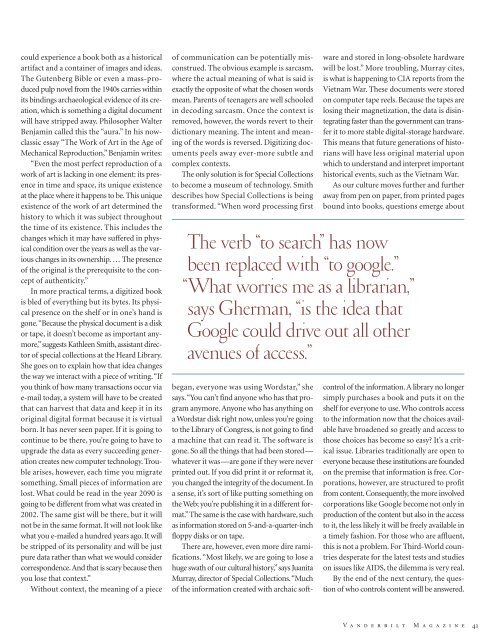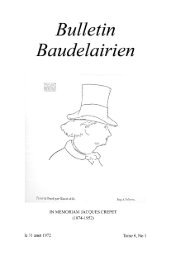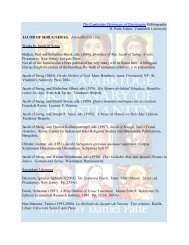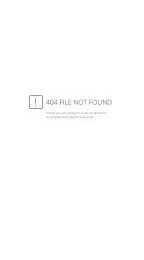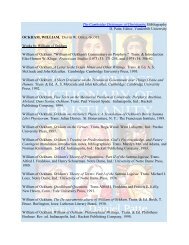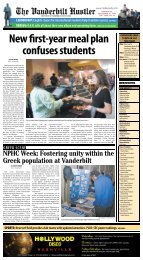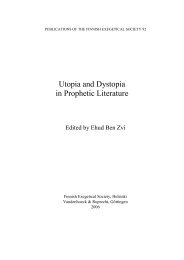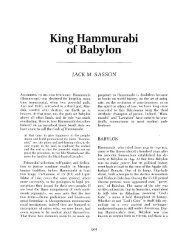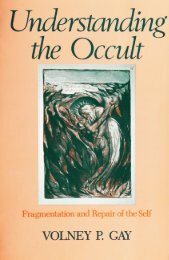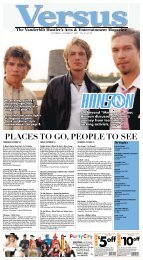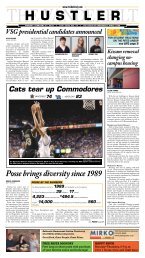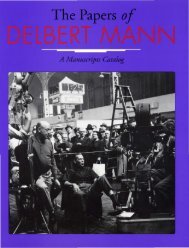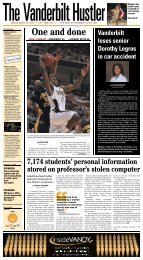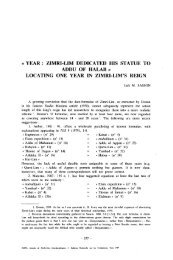From the Editor From the Reader - DiscoverArchive Home ...
From the Editor From the Reader - DiscoverArchive Home ...
From the Editor From the Reader - DiscoverArchive Home ...
Create successful ePaper yourself
Turn your PDF publications into a flip-book with our unique Google optimized e-Paper software.
could experience a book both as a historical<br />
artifact and a container of images and ideas.<br />
The Gutenberg Bible or even a mass-produced<br />
pulp novel from <strong>the</strong> 1940s carries within<br />
its bindings archaeological evidence of its creation,<br />
which is something a digital document<br />
will have stripped away. Philosopher Walter<br />
Benjamin called this <strong>the</strong> “aura.” In his nowclassic<br />
essay “The Work of Art in <strong>the</strong> Age of<br />
Mechanical Reproduction,” Benjamin writes:<br />
“Even <strong>the</strong> most perfect reproduction of a<br />
work of art is lacking in one element: its presence<br />
in time and space, its unique existence<br />
at <strong>the</strong> place where it happens to be. This unique<br />
existence of <strong>the</strong> work of art determined <strong>the</strong><br />
history to which it was subject throughout<br />
<strong>the</strong> time of its existence. This includes <strong>the</strong><br />
changes which it may have suffered in physical<br />
condition over <strong>the</strong> years as well as <strong>the</strong> various<br />
changes in its ownership. … The presence<br />
of <strong>the</strong> original is <strong>the</strong> prerequisite to <strong>the</strong> concept<br />
of au<strong>the</strong>nticity.”<br />
In more practical terms, a digitized book<br />
is bled of everything but its bytes. Its physical<br />
presence on <strong>the</strong> shelf or in one’s hand is<br />
gone.“Because <strong>the</strong> physical document is a disk<br />
or tape, it doesn’t become as important anymore,”suggests<br />
Kathleen Smith, assistant director<br />
of special collections at <strong>the</strong> Heard Library.<br />
She goes on to explain how that idea changes<br />
<strong>the</strong> way we interact with a piece of writing.“If<br />
you think of how many transactions occur via<br />
e-mail today, a system will have to be created<br />
that can harvest that data and keep it in its<br />
original digital format because it is virtual<br />
born. It has never seen paper. If it is going to<br />
continue to be <strong>the</strong>re, you’re going to have to<br />
upgrade <strong>the</strong> data as every succeeding generation<br />
creates new computer technology. Trouble<br />
arises, however, each time you migrate<br />
something. Small pieces of information are<br />
lost. What could be read in <strong>the</strong> year 2090 is<br />
going to be different from what was created in<br />
2002. The same gist will be <strong>the</strong>re, but it will<br />
not be in <strong>the</strong> same format. It will not look like<br />
what you e-mailed a hundred years ago. It will<br />
be stripped of its personality and will be just<br />
pure data ra<strong>the</strong>r than what we would consider<br />
correspondence. And that is scary because <strong>the</strong>n<br />
you lose that context.”<br />
Without context, <strong>the</strong> meaning of a piece<br />
of communication can be potentially misconstrued.<br />
The obvious example is sarcasm,<br />
where <strong>the</strong> actual meaning of what is said is<br />
exactly <strong>the</strong> opposite of what <strong>the</strong> chosen words<br />
mean. Parents of teenagers are well schooled<br />
in decoding sarcasm. Once <strong>the</strong> context is<br />
removed, however, <strong>the</strong> words revert to <strong>the</strong>ir<br />
dictionary meaning. The intent and meaning<br />
of <strong>the</strong> words is reversed. Digitizing documents<br />
peels away ever-more subtle and<br />
complex contexts.<br />
The only solution is for Special Collections<br />
to become a museum of technology. Smith<br />
describes how Special Collections is being<br />
transformed. “When word processing first<br />
began, everyone was using Wordstar,” she<br />
says.“You can’t find anyone who has that program<br />
anymore. Anyone who has anything on<br />
a Wordstar disk right now, unless you’re going<br />
to <strong>the</strong> Library of Congress, is not going to find<br />
a machine that can read it. The software is<br />
gone. So all <strong>the</strong> things that had been stored—<br />
whatever it was—are gone if <strong>the</strong>y were never<br />
printed out. If you did print it or reformat it,<br />
you changed <strong>the</strong> integrity of <strong>the</strong> document. In<br />
a sense, it’s sort of like putting something on<br />
<strong>the</strong> Web; you’re publishing it in a different format.”The<br />
same is <strong>the</strong> case with hardware, such<br />
as information stored on 5-and-a-quarter-inch<br />
floppy disks or on tape.<br />
There are, however, even more dire ramifications.<br />
“Most likely, we are going to lose a<br />
huge swath of our cultural history,” says Juanita<br />
Murray, director of Special Collections.“Much<br />
of <strong>the</strong> information created with archaic soft-<br />
ware and stored in long-obsolete hardware<br />
will be lost.” More troubling, Murray cites,<br />
is what is happening to CIA reports from <strong>the</strong><br />
Vietnam War. These documents were stored<br />
on computer tape reels. Because <strong>the</strong> tapes are<br />
losing <strong>the</strong>ir magnetization, <strong>the</strong> data is disintegrating<br />
faster than <strong>the</strong> government can transfer<br />
it to more stable digital-storage hardware.<br />
This means that future generations of historians<br />
will have less original material upon<br />
which to understand and interpret important<br />
historical events, such as <strong>the</strong> Vietnam War.<br />
As our culture moves fur<strong>the</strong>r and fur<strong>the</strong>r<br />
away from pen on paper, from printed pages<br />
bound into books, questions emerge about<br />
The verb “to search” has now<br />
been replaced with “to google.”<br />
“What worries me as a librarian,”<br />
says Gherman, “is <strong>the</strong> idea that<br />
Google could drive out all o<strong>the</strong>r<br />
avenues of access.”<br />
control of <strong>the</strong> information. A library no longer<br />
simply purchases a book and puts it on <strong>the</strong><br />
shelf for everyone to use. Who controls access<br />
to <strong>the</strong> information now that <strong>the</strong> choices available<br />
have broadened so greatly and access to<br />
those choices has become so easy? It’s a critical<br />
issue. Libraries traditionally are open to<br />
everyone because <strong>the</strong>se institutions are founded<br />
on <strong>the</strong> premise that information is free. Corporations,<br />
however, are structured to profit<br />
from content. Consequently, <strong>the</strong> more involved<br />
corporations like Google become not only in<br />
production of <strong>the</strong> content but also in <strong>the</strong> access<br />
to it, <strong>the</strong> less likely it will be freely available in<br />
a timely fashion. For those who are affluent,<br />
this is not a problem. For Third-World countries<br />
desperate for <strong>the</strong> latest tests and studies<br />
on issues like AIDS, <strong>the</strong> dilemma is very real.<br />
By <strong>the</strong> end of <strong>the</strong> next century, <strong>the</strong> question<br />
of who controls content will be answered.<br />
V a n d e r b i l t M a g a z i n e 41


